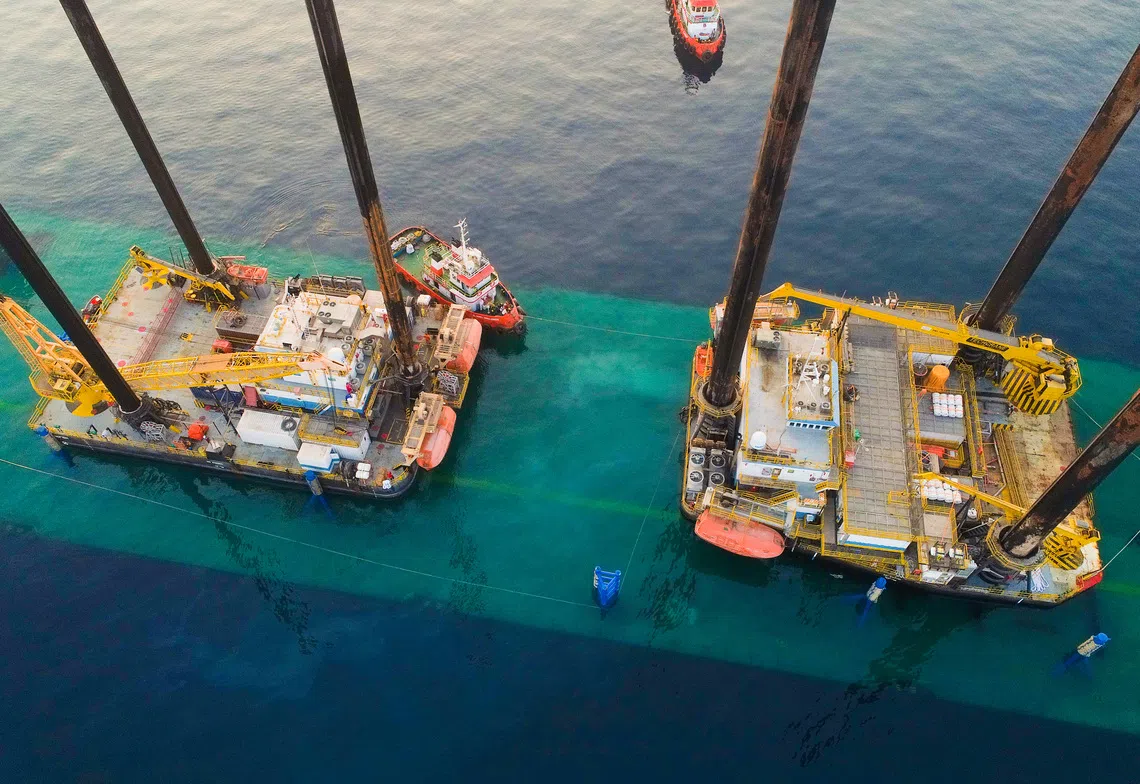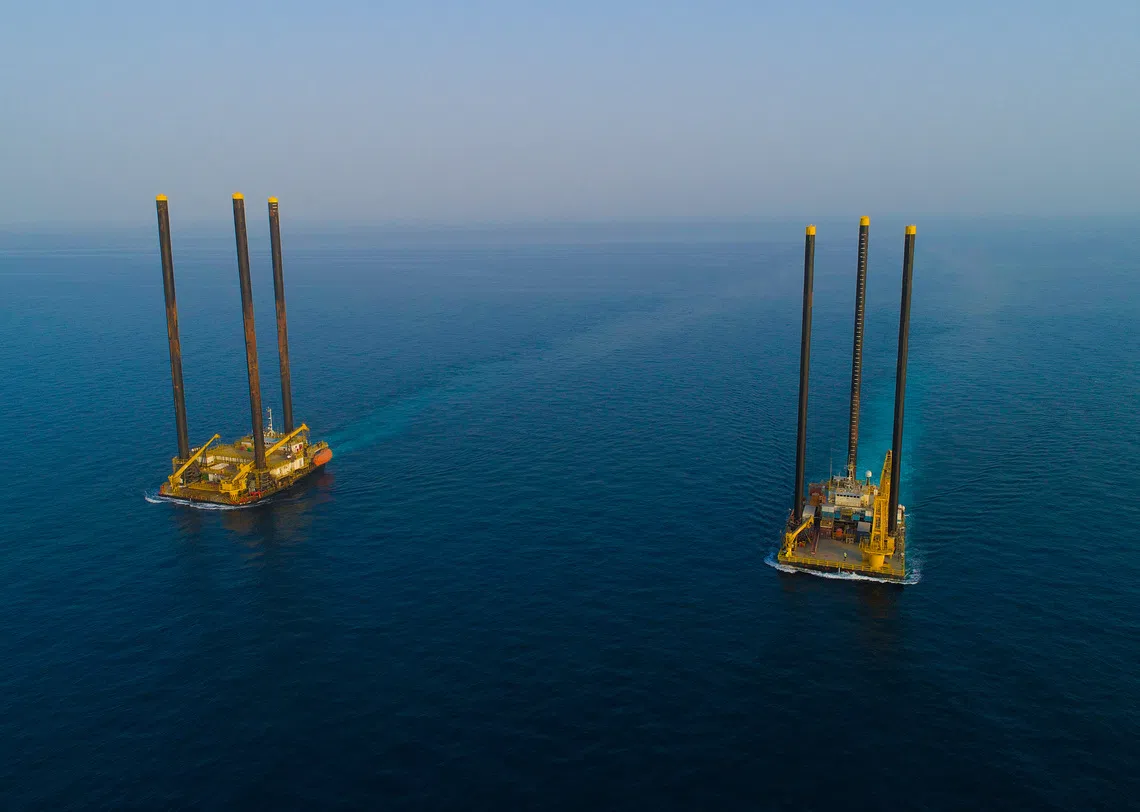Jub Pacific rides offshore oil and gas upturn by going global early
The liftboat operator is now moving to expand its fleet while making strides in Asia’s emerging offshore wind farm sector

[SINGAPORE] Going global early has paid off for home-grown liftboat operator Jub Pacific, which has benefited from the post-pandemic rebound in global offshore oil and gas activity.
Founded in 2018, the group provides specialised offshore marine services and manages a fleet of marine assets to support the oil and gas as well as renewable energy sectors.
From the outset, Kelvin Tang, the group’s managing director, was presented with a golden opportunity to venture abroad.
A few months after Jub Pacific was established, he was approached by the owner of GPK Marine Management Services – a ship management firm based in the United Arab Emirates (UAE) – to take over the business.
Established in 2012, GPK provides technical and commercial management services for liftboats.
A liftboat – also known as a jack-up barge – is a vessel equipped with legs that can be extended down to the seabed. It can transform into a stable offshore platform and is used to support oil and gas extraction, wind farm installation, and other maritime operations.
Navigate Asia in
a new global order
Get the insights delivered to your inbox.
For Tang, the deal was too good to be passed up.
At the time, he recognised that GPK’s six-year track record, along with its strong base of Middle Eastern customers, would immediately place Jub Pacific in a good position to enter the tightly regulated ship management sector.
So in 2019, Jub Pacific acquired GPK for an undisclosed sum. Shortly after, it set up a subsidiary in Nigeria to scale GPK’s business further and acquire new customers.
Today, over 95 per cent of the group’s revenue comes from overseas, with operations spanning the Middle East, West Africa and East Asia.
For its sustained international expansion efforts, Jub Pacific received the Internationalisation Award at this year’s Enterprise 50 (E50) Awards. It is the company’s first time participating in E50.

Tang noted that, following Russia’s invasion of Ukraine and the resulting sanctions, European companies have been pushed to diversify their energy sources, boosting demand for oil and gas from the Middle East.
This, in turn, has fuelled offshore oil and gas extraction activities in the area, leading to higher demand and higher charter rates for liftboats over the last few years, he said.
“During the last oil crisis in 2014, many Singapore marine and offshore companies folded. Since then, the sector has been down for nine years,” said Tang.
“But when the recovery happened, Jub Pacific was well-positioned (to ride this) as we had internationalised.”
Against this backdrop, he expects Jub Pacific’s revenue to grow 40 per cent year on year in FY2026.
Extending global reach
As part of its internationalisation strategy, Jub Pacific has been steadily investing in its own assets.
In 2021, it purchased its first liftboat in partnership with a Malaysia-listed company.
Today, Jub Pacific manages a fleet of 15 liftboats – including five of its own – and an accommodation rig through GPK, which serves as its ship management arm.
It currently owns five liftboats that are strategically located in Saudi Arabia, Ghana, Nigeria, Taiwan and China to service its customers. The other 10 are spread across the Middle East and West Africa.
Tang has now set his sights on entering the United States and the Gulf of Mexico, where he sees a shortage of large liftboats that Jub Pacific can help meet.
He noted that this comes in the wake of US-based shipowner Seacor Marine – one of the group’s competitors – selling two 335-foot class liftboats to a Nigerian firm in October 2025.
Jub Pacific has already engaged an in-market consultant to identify suitable opportunities in both markets. This includes securing liftboat charter contracts or entering a joint venture with a local company to establish a presence there.
Going into renewables
Recent years have seen Jub Pacific turn its attention to the nascent offshore wind energy sector in Asia.
The group was keen to contribute to the growing number of offshore wind farm projects there, said Tang, as European turbine makers began investing in markets such as Taiwan, Vietnam and China.
“We wanted to go in early with these European developers,” he said. “Renewables are the future; our assets are utilisable in this segment so naturally, we took notice.”
To gain a first-mover advantage, Jub Pacific brought two liftboats, King Fish and Whale Shark, from the Middle East to Taiwan in 2020, marking its expansion into Asia.
Both liftboats were used to conduct geotechnical studies, which involve testing and sampling the seabed to assess the area’s suitability for wind farm installation. The group subsequently set up a local entity in Taiwan and registered one vessel there.
“The markets in Asia are still developing, but we expect the wind farm industry to grow in the next eight to 10 years,” he said. “So we continue to monitor the space and will look into investing more in the next few years,” he said.
Such investments could include crew transfer vessels – which are used to transport wind farm technicians and other personnel out to sites – and wind turbine installation vessels.

Internationalisation, however, comes with its own fair share of challenges.
One barrier has been navigating different flagstate and local maritime regulations across overseas markets, said Tang.
Many countries impose local content requirements, which are policies mandating that a certain share of goods, services, labour or investments in projects come from local businesses and workers.
This requires Jub Pacific to significantly embed itself in the regions in which it operates, by hiring locals, partnering with local companies to form joint ventures or setting up regional offices.
Another challenge is a shortage of certified crew for liftboats and specialised offshore equipment. To build a pipeline of talent, the group organises internal training programmes and partnerships with maritime academies.
Fleet diversification
Beyond liftboats, Jub Pacific wants to expand into offshore supply vessels (OSVs) to diversify its fleet.
OSVs include anchor handling tugs and platform supply vessels, which mainly support offshore oil and gas activities.
“Whether liftboats or OSVs, we want to be a market leader in any ventures that we are involved in,” said Tang.
With that in mind, he is now working on building up OSV capabilities in South-east Asia, starting with Malaysia and Brunei. In October, the group established a company in Kuala Lumpur.
“When we bought GPK last time, it allowed us to grow faster because the company already had a track record,” he explained. “But when you want to build a new track record from scratch for OSVs, that takes time.”
To secure charter contracts for OSVs, Tang is looking at forming strategic partnerships with local engineering, procurement and construction firms in Malaysia and Brunei over the next three years.
Besides South-east Asia, the group also wants to deepen its footprint in Qatar.
The country – which is a major producer and exporter of liquified natural gas – has put out more tenders for offshore oil and gas redevelopment projects of late, said Tang, noting that such projects will require both liftboat and OSV services.
In the long-term, Jub Pacific aims to acquire more OSVs and rejuvenate its existing fleet of liftboats.
That means building bigger liftboats capable of working in deeper waters, which will allow the group to better service markets such as Malaysia and Qatar that have stricter vessel requirements, said Tang. He also hopes to expand the accommodation capacity for offshore crew.
“We don’t want to become obsolete, so it’s important to own assets that are always relevant to our clients’ needs,” he said.
The group is aiming to build two liftboats in the next four to five years, as well as acquire three more over the next 12 months.
An initial public offering (IPO) is also on the cards.
Tang said the group has begun engaging IPO advisers and is aiming to list in Singapore, Malaysia or the US by early 2027.
Decoding Asia newsletter: your guide to navigating Asia in a new global order. Sign up here to get Decoding Asia newsletter. Delivered to your inbox. Free.
Copyright SPH Media. All rights reserved.

